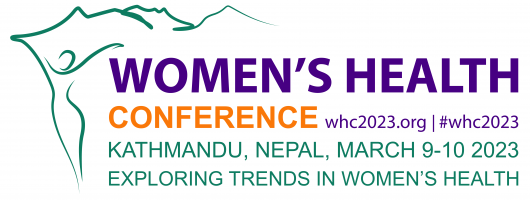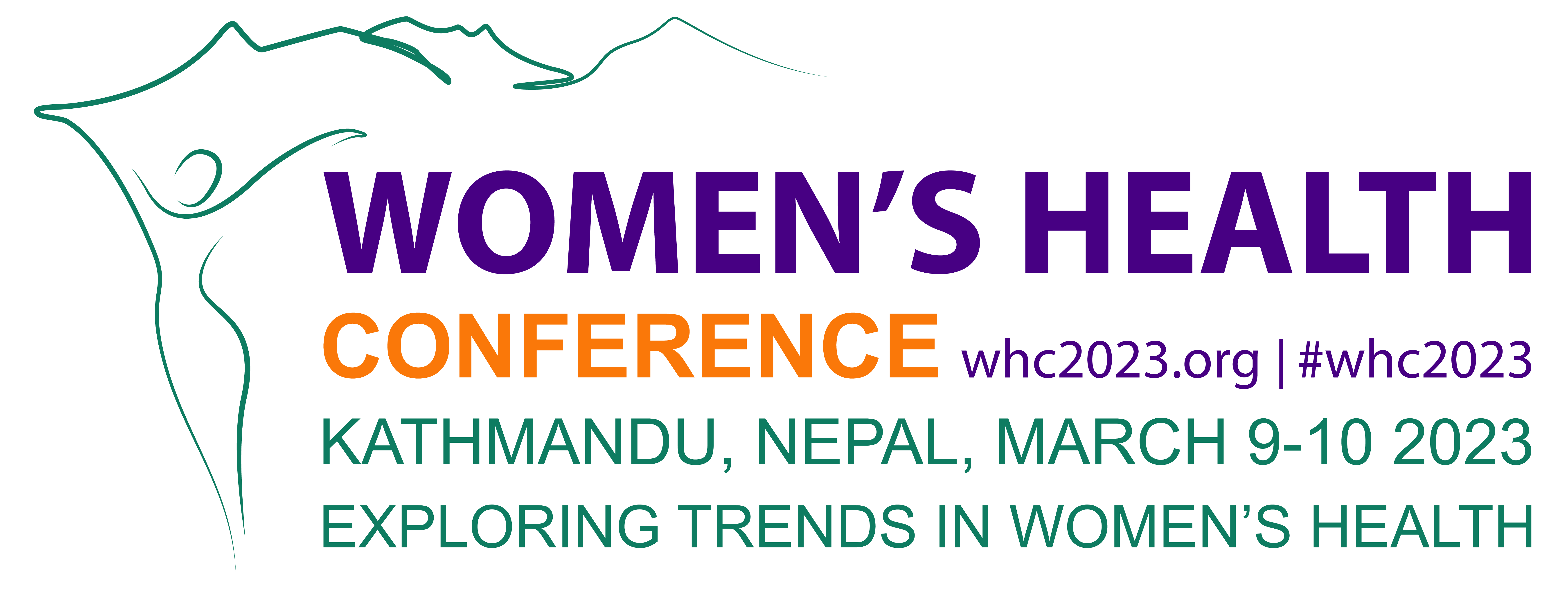Program
Context:
Health, without doubt, is a matter of concern for all genders. However, as with other issues pertaining to women, it is high time that women’s wellbeing is defined beyond just their reproductive roles and associated conditions. As stated by WHO, being a man or a woman has a significant impact on health, as a result of both biological and gender-related differences. The health of women and girls is of particular concern because, in many societies, they are disadvantaged by discrimination rooted in sociocultural factors (as; unequal power relationships between men and women; social norms that decrease education and paid employment opportunities; an exclusive focus on women’s reproductive roles; and potential or actual experience of physical, sexual and emotional violence.) Conditions that affect both men and women, such as cardiovascular disease, osteoporosis, also manifest differently in women.
The overall “health of women” includes medical conditions which are not just directly related to their biology but also gender-differentiated access to medical treatment and other socioeconomic factors. Therefore, while part of the issues in women’s health is due to their reproductive and sexual health needs, they also have more chronic non-reproductive health issues such as cardiovascular disease, cancer, mental illness, diabetes and osteoporosis, etc.
This conference has attempted to bring forth the following list ((suggestive but not limited to) of issues pertaining to Women’s Health in the discourse for overall “Health of Women”:
1. Cancer
2. Reproductive health (Lifecycle perspective including infertility care)
3. Maternal Health
4. HIV/STI
5. Violence against women
6. Mental Health
7. Noncommunicable diseases
8. Child and Adolescent and Elderly Health
9. Nutrition
Conference Theme: Exploring Trends in Women’s Health
SUB THEMES:
To achieve the above objectives, the conference will be structured around the following five sub themes pertaining to Women:
- Sexual and Reproductive Health and Rights (SRHR)
- Non-Communicable Diseases (NCDs)
- Child, Adolescent, Elderly Health
- Women’s Health in Humanitarian Setting
- Nutrition
Each of the sub-themes will cover programs in research, curricula, training modalities, policy engagement, practice, advocacy etc. The following are the suggested broad themes that could be covered under the above sub themes:
a. Innovations and approaches in women health.
b. Socio-economic, cultural, and religious systems and women’s health.
c. Rights based approaches (HRBA) to women’s health services.
d. Leadership, Governance, Human Resources for Health, and Empowerment.
Conference Information
Exhibition Area: An exhibition area will feature stalls and booths from key organizations. Please contact us if you would like to apply for a space.
Accessibility: Interpreter services will be available for multiple languages. Sign Language will also be available.
Schedule
Day 1
Day 2
- Meh synth Schlitz, tempor duis single-origin coffee ea next level ethnic fingerstache fanny pack nostrud. Photo booth anim 8-bit hella, PBR 3 wolf moon beard Helvetica. Salvia esse nihil, flexitarian Truffaut synth art party deep v chillwave.BusinessEngineeringGrowthPlatformWhereHall 1, Building A
- Meh synth Schlitz, tempor duis single-origin coffee ea next level ethnic fingerstache fanny pack nostrud. Photo booth anim 8-bit hella, PBR 3 wolf moon beard Helvetica. Salvia esse nihil, flexitarian Truffaut synth art party deep v chillwave.EngineeringPlatformWhereHall 1, Building A
- 10:00 - 10:30
Coffee Break
- 10:30 - 12:00
Evolution of User Experience
By Danielle Ahn Co-founder Zipcar, Piera Mcclure Creative Director SlackMeh synth Schlitz, tempor duis single-origin coffee ea next level ethnic fingerstache fanny pack nostrud. Photo booth anim 8-bit hella, PBR 3 wolf moon beard Helvetica. Salvia esse nihil, flexitarian Truffaut synth art party deep v chillwave.BusinessGrowthWhereHall 1, Building A - Meh synth Schlitz, tempor duis single-origin coffee ea next level ethnic fingerstache fanny pack nostrud. Photo booth anim 8-bit hella, PBR 3 wolf moon beard Helvetica. Salvia esse nihil, flexitarian Truffaut synth art party deep v chillwave.BusinessPlatformWhereHall 1, Building A
- 13:00 - 14:30
Lunch time!
- Meh synth Schlitz, tempor duis single-origin coffee ea next level ethnic fingerstache fanny pack nostrud. Photo booth anim 8-bit hella, PBR 3 wolf moon beard Helvetica. Salvia esse nihil, flexitarian Truffaut synth art party deep v chillwave.EngineeringPlatformWhereHall 1, Building A
- Meh synth Schlitz, tempor duis single-origin coffee ea next level ethnic fingerstache fanny pack nostrud. Photo booth anim 8-bit hella, PBR 3 wolf moon beard Helvetica. Salvia esse nihil, flexitarian Truffaut synth art party deep v chillwave.BusinessGrowthWhereHall 1, Building A
- Meh synth Schlitz, tempor duis single-origin coffee ea next level ethnic fingerstache fanny pack nostrud. Photo booth anim 8-bit hella, PBR 3 wolf moon beard Helvetica. Salvia esse nihil, flexitarian Truffaut synth art party deep v chillwave.BusinessGrowthWhereHall 1, Building A
- Meh synth Schlitz, tempor duis single-origin coffee ea next level ethnic fingerstache fanny pack nostrud. Photo booth anim 8-bit hella, PBR 3 wolf moon beard Helvetica. Salvia esse nihil, flexitarian Truffaut synth art party deep v chillwave.EngineeringPlatformWhereHall 1, Building A
- Meh synth Schlitz, tempor duis single-origin coffee ea next level ethnic fingerstache fanny pack nostrud. Photo booth anim 8-bit hella, PBR 3 wolf moon beard Helvetica. Salvia esse nihil, flexitarian Truffaut synth art party deep v chillwave.EngineeringGrowthPlatformWhereHall 1, Building A
- Meh synth Schlitz, tempor duis single-origin coffee ea next level ethnic fingerstache fanny pack nostrud. Photo booth anim 8-bit hella, PBR 3 wolf moon beard Helvetica. Salvia esse nihil, flexitarian Truffaut synth art party deep v chillwave.BusinessPlatformWhereHall 1, Building A
- 10:00
Coffee Break
- Meh synth Schlitz, tempor duis single-origin coffee ea next level ethnic fingerstache fanny pack nostrud. Photo booth anim 8-bit hella, PBR 3 wolf moon beard Helvetica. Salvia esse nihil, flexitarian Truffaut synth art party deep v chillwave.BusinessGrowthWhereHall 1, Building A
- Meh synth Schlitz, tempor duis single-origin coffee ea next level ethnic fingerstache fanny pack nostrud. Photo booth anim 8-bit hella, PBR 3 wolf moon beard Helvetica. Salvia esse nihil, flexitarian Truffaut synth art party deep v chillwave.BusinessGrowthWhereHall 1, Building A
- 13:00 - 14:30
Lunch Time!
- Meh synth Schlitz, tempor duis single-origin coffee ea next level ethnic fingerstache fanny pack nostrud. Photo booth anim 8-bit hella, PBR 3 wolf moon beard Helvetica. Salvia esse nihil, flexitarian Truffaut synth art party deep v chillwave.BusinessGrowthWhereHall 1, Building A
- Meh synth Schlitz, tempor duis single-origin coffee ea next level ethnic fingerstache fanny pack nostrud. Photo booth anim 8-bit hella, PBR 3 wolf moon beard Helvetica. Salvia esse nihil, flexitarian Truffaut synth art party deep v chillwave.EngineeringPlatformWhereHall 1, Building A
- Meh synth Schlitz, tempor duis single-origin coffee ea next level ethnic fingerstache fanny pack nostrud. Photo booth anim 8-bit hella, PBR 3 wolf moon beard Helvetica. Salvia esse nihil, flexitarian Truffaut synth art party deep v chillwave.BusinessWhereHall 1, Building A
- Meh synth Schlitz, tempor duis single-origin coffee ea next level ethnic fingerstache fanny pack nostrud. Photo booth anim 8-bit hella, PBR 3 wolf moon beard Helvetica. Salvia esse nihil, flexitarian Truffaut synth art party deep v chillwave.EngineeringWhereHall 1, Building A
- 18:00 - 20:00
After Party!
Program Schedule
Conference Day 1
9th March 2023 (25th Falgun, 2079), Thursday
Yak and Yeti Hotel, Durbarmarg, Kathmandu
| Time | Activity | |
|---|---|---|
| 8:00- 8:30 A:M | Registration | |
| 8:30- 10:00 | Opening Ceremony/ including Keynote speech Chairing of the Conference Inauguration • Hon. Minister- Chief Guest – Rekha Sharma – Ministry of • Information and Communication • Health Secretary, MoHP- Chair – Dr. Roshan Pokharel • Additional Health Secretary, MoHP – Dr. Sangeeta Mishra • Ambassador Kavitha Kasyanathan (Australia), Dr. Thomas Prinz (Germany), Torun Dramdol (Norway) • Director General, DoHS – Dr. Dipendra Raman Singh • Director General, DDA – Bharat Bhattarai • Director General, Department of Ayurveda, and alternate medicine – Dr. Vasudev Upadhaya • Director, Family Welfare Division – Dr. Bibek Kumar Lal • EDP Chair – Nur Pant • AIN Chair – Bhagwan Shrestha • UNFPA – Country Representative – Won Young Hong • WHO – Country Representative – Dr. Rajesh Sambhajirao Pandav • UNICEF – Country representative – Elke Wisch National Anthem & Inauguration Session • Opening Remarks • Welcome speech and presentation -Director FWD (10 min) Inauguration • Keynote Speaker – Dr. Sudha Sharma • Remarks from AIN (Bhagwan Shrestha) • Remarks from Country Representative from UNFPA Nepal (with representation of UN Agencies) • Remarks from Ambassador • Remarks from High delegate Government Officials • Remarks from chief guest • Closing remarks - Health secretary (Chair of session) |
|
| 10:00- 10:30 | Tea Break | |
| 10:30- 11:30 | Community Voice (Bandana Khad (5min) and Activist) followed by Plenary Session: “Achievement, Issues and Challenges in Women's Health.” Panelist: - Hon. Vidya Sinha (Women Commission), Dr. Sangeeta Mishra (MoHP), Dr. Saroj Ojha (Mental Health), Kamakshi Yakthumba (Australian Embassy) Moderator: - Nita Sapkota |
|
| 11:30-12:15 | Poster Presentation A. Implications for the health of young women working in hospitality sector in urban, Nepal – Sushmita Mali B. Adolescent reproductive health: Status, needs, and gaps at the community, and Public and Private Health Facility – implications for program design - Manisha Laxmi Shrestha C. Health Problems and Behaviors of Older Women in Rural Communities, Nuwakot, Nepal – Shristi Mainali D. Assessment of knowledge, attitude, and practice on menstrual hygiene management among school going adolescent girls in selected schools of Kohalpur Municipality – Sumnima Shrestha E. Quasi Experimental Research on Home Based Parenting Program in Collaboration with Monash University - Kiran Prasad Bhandari F. Barriers and Facilitators to Access SRH Information and Services amongst Adolescents during Covid 19 Pandemic in Sindhupalchowk, Nepal - Saki Thapa G. The Impact of Local Community Health Workers’ Response on Maternal and Child’s Health in a Home-to-Facility Health System During COVID-19 Pandemic in Rural Nepal - Usha Ghimire H. Human resources for sexual, reproductive, maternal, newborn, and adolescent health: What evidence suggests? – Laxmi Tamang I. Economical, Educational and Residential Inequalities in Health Intervention Coverage among South-Asian women - Rimjhim Bajpai J. Revitalizing health mothers’ groups through Rural health improvement project - Sandeep Ghimire K. Trend of women’s experience of restriction during menstruation and its associated factor in Nepal: Comparison of 2014 and 2019 round of Nepal Multiple Indicator Cluster Survey – Navaraj Bhattarai L. Strengthening access to emergency obstetric care in a federal context – some lessons - Sharada Basnet M. Prevalence of gender-based violence by types and severity of disability among 15-59 years women in Nepal - Bikesh Bajracharya N. Making maternal health services accessible and equitable – a review of the evidence - Milima Dangol O. Analysis of barriers to utilization of maternal, newborn, and child health and family planning services - Roshna Rajbhandari P. Perceived maternal role competence and its associated factors among primi mothers attending immunization clinic in tertiary hospital - Srijana Shah Q. Barriers of Safe Abortion Services - Radhika Ghimire R. Unmet needs for adolescent and teenage pregnancy in Nepal - Bishnu Prasad Dulal S. Does Education-contraception empower women? Evidence from NDHS 2011 and 2016 - Bidhya Shrestha |
|
| 12:30-1:30 | Lunch | |
| 1:30-2:30 | Break Out Sessions Special Session I: Adolescent Sexual and Reproductive Health and Rights- (Hall 1) Presentation: - Bandana Pradhan and Niva Shakya Moderator: - Dr. Rajendra Bhadra Panelist: - CHERD, Suzzanne Reier, Kabita Aryal, Medha Sharma. | Special Session II: Women's Health in Humanitarian Setting – (Hall 2) Moderator – Dr. Khem Karki Panelist: - Bhola Ghimire, Hari Karki, Tom Pignon, Dip Narayan Sapkota, Dr. Pawan Kumar Sah |
| 2:30- 4:00 | Parallel Session I: Sexual and Reproductive Health and Rights (Five Paper presentations)-Hall 1 A. Trend and Factors Associated with Unintended Pregnancy among Currently Married Women in Nepal: An Issue of Reproductive Autonomy - Rita Devi Karki B. The cost of menstrual cycle and its association with hygiene among the women of Madhyapur Thimi, Bhaktapur: A cross sectional study - Shraya Bhasink Shrestha C. Women’s experience of disrespect and abuse during institutional delivery in Eastern Nepal - Narayani Paudel D. A study on disposal practices of sanitary pads in public schools – Aliza Singh E. Training Efficacy and Tracking Advanced Skilled Birth Attendant Graduates in Nepal - Bal Sunder Chansi Chair: Dr. Kiran Regmi Co- Chair: - Dr Jagadish Joshi | Parallel Sessions II: Women’s Health in Humanitarian Setting and Workplace (Five Paper Presentations) – Hall 2 A. Reaching The Unreached- Ensuring COVID-19 Vaccination Access for Women during Health Emergency – Dr. Suman S. Rawal B. Impact Of Mobile COVID-19 Vaccination Services (MoCoVs) In Delivering Care to Difficult-To-Reach Populations – Latshering Glan Tamang C. Ensuring access to Medical Abortion during the COVID-19 pandemic – Shristi Mainali D. Workplace Menstrual health and Hygiene in the private sector: Results from the pilot in Kenya and Nepal – Dr. Anjana Dongol E. Status of airlifting program to save lives of mother and child in Gandaki province – Baburam Acharya Chair: - Dr. Binjwala Shrestha Co-Chair: - Kim Khadka (Gandaki Province) |
| 3:00 - 4:00 | Parallel Session III: Sexual and Reproductive Health and Rights (Six Paper presentations)- Hall 1 A. Association between Gestational weight gain rate and cesarean delivery in Nepalese women – Jyoti Nepal B. Prevalence and Associated Factors of Gender Based Violence among secondary School Female Students of Sarlahi, Nepal – Laxmi Gautam C. What shapes men’s exclusion practices during menstruation?” A mixed method study from a municipality of Lumbini Province - Bhawana Pandey D. Determinants of institutional delivery and reasons of home delivery in Karnali Province of Nepal - Karuna Bhattarai E. Abortion laws in Nepal: addressing challenges and protecting women's rights - Samita Ghimire F. Evaluation of the effectiveness of Post-Partum Family Planning (PPFP) promotion at Health Facilities in Nepal – A Pilot study of ADRA PPFP Institutionalization Program – Sujit Kumar Sah Chair: - Prof. Goma Devi Niraula Co-chair: - Dr. Suresh Mehata | Parallel Sessions IV: Child Adolescent and Elderly (Six Paper presentations)- Hall 2 A. Teenage pregnancy and the sociodemographic attributes as a major contributor: Findings from an urban referral center in Nepal – Puja Thapa B. The role of VSO’s blended volunteering for development in transforming harmful social and gender norms among adolescents and young people – Priti Sharma C. A simulation-based training program to improve access to quality newborn care in Primary healthcare facilities of Baridya, Nepal – Kiran Bajracharya D. Awareness and Prevalence of Abuse among Older People residing in Madhyapur Thimi – Rupa Pyatha E. Awareness regarding Teenage Pregnancy among Secondary School Going Adolescents of Kathmandu Metropolitan City – Asmita Aryal Chair: - Dr. Ramesh Kant Adhikari(TBD) Co-Chair: - Sharmila Dahal (NSSD) |
| 4:00 - 5:00 | Parallel Session V - Sexual and Reproductive Health and Rights- (Five Paper presentations)- Hall 1 A. Women’s Autonomy and Maternal Health Service Utilization in Surkhet District - Dipa Bhattarai B. A comparative study on intimate partner physical violence and associated factors - Dr. Tripti Pal Raman C. Breastfeeding self- efficacy and associated factors among postpartum mothers visiting maternal child health clinic in tertiary hospital - Sujita Bati D. Extent of adherence to socially accepted menstrual taboos and its impact on the wellbeing of post-menarche adolescent girls and young women in Nepal - Aagya Khanal E. Menstrual hygiene friendliness of selected schools in Kathmandu Valley - Medha Sharma Chair: - Dr. Rajendra Bhadra Co-Chair: - Apekchya Rana Khatr | Parallel Session VI- Mental Health- (Four Paper presentations)- Hall 2 A. Psychological distress and its associated factors among young married women in Nepal – Anisha Chalise B. Physical and Psychological Problems faced by Breast Cancer Survivors in Cancer Hospital, Nepal - Nima Maharjan C. Extent of socio-psychological pressures faced by married men to have a son: Findings from men’s perspective study - Achala Shrestha D. Factors Contributing to Depression, Anxiety and Stress During Menstruation Among the Adolescent Girls of Province One, Nepal – Supriya Rana Chair: - Dr. Ananta Raj Sharma Co-chair: - Dr. Mita Rana |
| 5:00 Onwards | Tea and Networking |
|
Conference Day 2
10th March 2023 (26th Falgun, 2079), Friday
Yak and Yeti Hotel, Durbarmarg, Kathmandu
| Time | Activity | |
|---|---|---|
| 8:30-9:00 A:M | Check in and Registration | |
| 9:00- 10:30 | Plenary Session: Inclusion in Women's Health: Challenges and way forward Panelist: - Dev Kumari Parajuli, Roshani Devi Karki, Poonam Karn - Deputy Mayor (Kabilashi Municipality) Moderator: Anita Bindu |
|
| 9:00- 10:00 | Special Session 3: Women’s Health and Nutrition (Hall 1) Presentation: - Lila Bikram Thapa and Dr. S. Maknikar/T. Ng’ong’a Panelist: - Devendra Adhikari (USAID), Laxmi Ghimire (NPC), Karan Courtney Hag (UNICEF) Moderator: - K P Lamsal | Special Session 4: Women’s Health and NCD (cervical cancer) (Hall 2) Presentation - Dr Sameena, (WHO) Dr Jitendra Pariyar (civil hospital), FWD Chair Dr. Pawan Jung Rayamajhi Co-Chair: Dr Sadeep Shrestha |
| 10:00- 10:30 | Tea Break | |
| 10:30-12:00 | Parallel Sessions VII- Nutrition (Four Paper presentation) – Hall 1 A. Improving maternal nutrition and health behavior through SBCC intervention: Evidence from USAID’s Suaahara program – Ramesh Adhikari B. Association of mother's nutritional knowledge and acute malnutrition. A case study from Nutrition rehabilitation homes – Renu Karki C. Timely Initiation of Breast Feeding and Associated Factors Among Mothers of Infant aged 0-6 months attending Western Regional Hospital – Jagat Prasad Upadhaya D. Knowledge and Practice of Exclusive breastfeeding and its factors among job holder mothers of Lalitpur Metropolitan City – Hasina Shrestha E. Tele-monitoring services to pregnant women with gestational diabetes mellitus (GDM) in Dhulikhel Hospital, Nepal - Kalpana Chaudhary Chair: - Dr. Binod Giri Co-Chair: - Dr. Gauri Pradhan | Parallel Sessions VIII: Non Communicable Disease – (Six Paper Presentation)- Hall 2 A. Cervical cancer screening service utilization and its associated factors among women in tertiary hospital – Anju Kharel B. Feasibility and Acceptability of Alternative Approach to Cervical Cancer Screen in Nepal: Service Providers’ Perspective – Saki Thapa C. Screening Prevalence and Associated Factors with Postpartum Depression Among Mothers Attending Immunization Clinics in Bharatpur Metropolis – Sumnima Shrestha D. Impact of Roving Service Providers on Cervical Cancer Screening and Referral Uptake in Nepal – Sunil Kumar Sah E. Integrated Cancer Care Approach to Improve Women's Health – Pramod Bhatta Chair: - Prof Dr. Yogendra Gurung Co-Chair: - Dr Sarita Ghimire |
| 12:00-12:30 | Poster Presentation A. Cervical Cancer Dataset Creation to Develop Machine Learning Based Screening Tools - Lisasha Poudel B. Drivers, manifestations, and outcome of Cervical Cancer Stigma; A qualitative study in Nepal - Bandana Paneru C. Outcome of patients presenting with peripartum cardiomyopathy in a tertiary care center of Nepal - Smriti Shakya D. Psychosocial Problems in Women Attending Infertility Centers in Kathmandu Valley – E. Screening of cervical cancer and breast cancer in the Belbari Municipality - Asmita Rayamajhi F. Addressing the Maternal Mental Health Care Gap in a Low-resource Setting of Nepal through the Smile-Mother Program - Prajjwal Pokharel G. Maternal Disparities and Its' Outcome on Child Nutrition and Illness - Nirdesh Baral H. Barriers to Menstrual Hygiene Management in school environment among adolescent girls of tatopani rural municipality, Jumla: a school based cross sectional study - Deepa Upadhayay I. Game-based learning as a tool to contextualize dialogue, negotiations, and conflicting opinions that may frame SRHR decision-making - Bandana Pradhan J. Situation of Abortion Stigma among girls and women of reproductive age (WRA) in selected districts of Nepal - Parash Prasad Phuyal K. Establishment, operation, and utilization of maternity waiting homes – sharing experiences of Baglung District - Chandra Gyawali L. Youth for Access to Abortion for Youth (YAAY): Showcasing youth-led advocacy for safe abortion in Nepal - Shilpa Lamichhane M. Prevalence of gender based violence and its associated factors among adolescent girls and young women in Nepal - Sarmila Dhakal N. Utilization of Nepal’s free maternal health care services among women of Bhediyahi-15, Birgunj, Parsa: A descriptive cross-sectional study - Trishna Rai O. Assessing a person-centered approach to Postpartum Contraception through Community Health Workers in rural Nepal - Rekha Khatri P. The Chepang: Enhancing Nepal's Marginalized Indigenous Girls’ Sexual and Reproductive Health & Rights (SRHR) - Manisha Thapa Q. Candida species in genital tract of pregnant women during first trimester of pregnancy – Maya Rai Comparison of home-based to health facility-based postnatal care in Nawalparasi district of Nepal – Surya Gaire |
|
| 12:30-1:00 | Lunch | |
| 1:30-2:30 | Special Session 5: Human Resource for Women’s Health - Hall 1 Presentation: - Goma Niraula Panelist: Dr. Krishna Paudel, MEC, CTEVT Moderator: - MIDSON | Special Session 6: Political economic analysis of ending Preventable Death of mothers and children: Hall 2 Presentation: Deepak Karki, Sudeep Pokhrel followed by Panel discussion Panelist: Dr. Bibek Kumar Lal, Deepak Karki, Sudeep Pokharel Moderator: - Dr. Poma Thapa (Curative Division) |
| 2:00-2:45 | Parallel Session 7: Non Communicable Disease and Human Resource for Women’s Health (Three Paper Presentation)- Hall 1 A. Situation of Cervical Cancer Screening Services in Nepal; A cross-sectional study – Bijaya Shrestha B. Study on Behavioral and Metabolic risk Factors of Cardiovascular Disease among Post-menopausal Women of the Itahari-Sub-metropolitan city of Nepal - Dr Deepak Kumar Yadav C. Global and regional Disability-Adjusted Life Years (DALYs) due to cardiovascular diseases among females in south Asian countries - Partha Sarathi Datta D. Work-Family Conflict and Coping Strategies among Nurses of a Selected Teaching Hospital Pokhara, Kaski Nepal - Jenny Ojha E. Assessing a person centered approach to postpartum contraception through community health worker in rural Nepal – Rekha Khatri Chair: - Dr. Archana Amatya Co-Chair: - Dr Rabin Khadka | Parallel Session 8: Non Communicable Disease and (Three Paper Presentation)- Hall 2 A. Experience of a systematic primary care recruitment strategy for cervical cancer screening in mostly postmenopausal women in the ex-Gurkha community - Dr. Gerda Pohl B. Suicidal and Self-harm Behaviors in Young Female Adults: A cross-sectional study in Kathmandu – Sagar Parajuli C. Impact of COVID-19 in respiratory health and Health related quality of life among women visiting the out-patient department of a primary care hospital in Nepal - Aishana Joshi D. Social Taboo and Psychological trauma prevalent among female cleft patients in Nepal - Dr. Rajib Khadka E. Role of Media for Women ‘s Health – Atul Mishra Chair: - Dr. Madan Upadhaya Co-Chair: - Dr. Sarita Ghimire |
| 2:45- 3:15 | Tea Break | |
| 3:15-4:00 | Panel Discussion- Women's Health in Federal Context (Provincial Representatives) Panelist: Province Secretary and Directors Moderator: - Bala Rai |
|
| 4:00-4:45 | Panel Discussion- Roadmap to Women's Health- EDPs Panelist: USAID, UKAID, UNFPA, UNICEF, WHO, GIZ, Australian Aid Moderator: - Bhim Prasad Sapkota |
|
| 4:40 onwards | Closing Session: Call for Dias Chairing of Closing Session – Director General DoHS, Dr. Dipendra Raman Singh Chief guest: - Chief Secretary, Shankar Das Bairagi Guest: - • Health Secretary, MoHP • Additional Health Secretary, MoHP • Ambassador (British Embassy Kathmandu) • Director General, DoHS Youth Call to Action with Live Illustration Conference Declaration Handover Closing Remarks Thank you and Closure Announcement |
|










